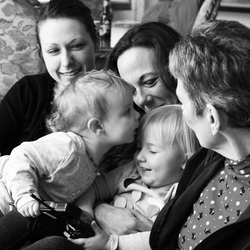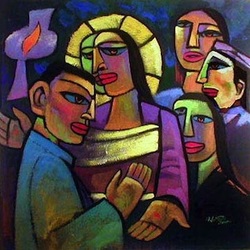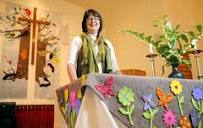 Life in the Balance John 14:15–21 It is the Sixth Sunday of Easter. It is also Heritage Sunday in the United Methodist Church, Aldersgate Sunday in the Wesleyan tradition, and Memorial Day in the United States of America. The modern impulse to organize and label that has fueled science, business, technology is evident in our labeling of days. Are they specimens for examination or the ministry of memory, dynamic evidence for learning? Methodist remember Aldersgate, May 24, 1738. It was that evening in England when our founder, John Wesley, was dragged reluctantlly to church, after an already chock-a-block day of challenging ministry, by his insistent brother. In the midst of the urgent work of that day and that time in the Methodist Movment, when Wesley was going full tilt, that evening's worship experience opened a space for grace in his soul that he called being "Strangely warmed. You remember don't you? But how? None of were there on May 24, 1738, were we? We remember because we mark the day, we tell the story, we hear the invitation that our hearts might also be strangely warmed. Its Memorial Day Weekend: a time for remembering and honoring those who gave their lives in battle, for tending the graves of the dead. We are always balancing between memory and vision, between past satisfactions and sorrows and the enduring kernel of joy full new life in each and every moment. Ernest remembers starting out in the US Army as a freshfaced kid learning to make a bed, scrub fixtures, do KP, and march with perfect discipline. One morning got called out at inspection for the three hairs on his chin. He hadn't shaved. Ernie’d NEVER shaved in his life. Two years, 385 combat days, and two purple hearts later, Ernie headed home looking for love, for a rebalancing point. He found it in the love of his life, Muriel, a love that over 60 years later still sparks the air between them. It is a love that carries God's healing grace and supplies the fulcrum between memory and vision. In scripture, remembering is not only recollection of the past. Again and again people are called on to remember the present, remember the future, remember God who holds past, present, future in God’s own life. For God’s people, memory is identity. And what we remember determines how we act. Failure to remember God’s actions is apostasy, unfaithfulness. God remembers too. It’s the things we wish God would forget that pin us down; things we've done and wish we hadn't, things we wish we had done and didn't. Things that we too often carry to the grave rather than letting them go so that we can live the life of grace. God’s action is guided by what God “remembers.” The new covenant declaration of Jeremiah 31: 31-34 says that “God will remember their sin no more.” God remains fully aware of the past, but not defined by it. But who are we without our sin when that has become the balance of our life? Doesn’t our past define us? Or at least, our memories of others' past actions define their idenity as far as we're concerned. We tend to mistake the status quo for balance, but have you ever tried to stand still on a balance beam? God is not the God of death but of life. Worship is remembering the living God, remembering who we are, that our balance is created by the living Christ’s presence. John 14: Jesus speaks to us today from the precarious balance point when his followers are beginning to realize life is never going to be the same, and not necessarily in the way they hoped for when they first joined him. Jesus offers to help them, and us, stay in balance, stay in God’s sweet spot. “The paraclete,” is a name that holds a multitude of meaning: encourage, teach, comfort, befriend..... Writer Bill O’Hanlon obeserves that- The difference between a wound that festers and diminishes us and one that leads to growth is whether or not we use the wound to energize us to change something in the world or to make a contribution. In the early 1820, before there was a Methodist society in Brunswick, but in the same years that Melville Cox began riding a preaching circuit here, Zenas and Merritt Caldwell were two of the first Methodist students at Bowdoin College. They would go on to lay the foundations of Methodist education in New England. (Cox went on to be the first Methodist Missionary to Africa, where he continued the emphasis on literacy education). Merritt and Zenas’ mother, Nancy Caldwell suffered both from fragile health and from the spiritual turmoil that was typical in those frontier days. When the boys were toddlers Nancy recorded in her journal that: “In the evening my husband came home, having been absent during the week. I soon began to tell him what God had done for my poor soul. He was very glad to find me so happy, as I had suffered much, both in body and mind, especially the last year. The more I talked of the wonderful works of God, the more I was blessed, til I could say me joys were full, my cup ran over, and I praised God with all my ransomed powers. I shall never find language here to describe my joys, but to listening angels, I expect to tell the story with an immortal tongue. ….I felt as perfectly free as an infant….death was disarmed of its terror.” Walking with God p. 34-35. She’d found her sweet spot. For God’s people, memory is identity. And what we remember shapes how we act. Prayer in the words of Ruth Duck: Book Of Worship #464 O God, in mystery and silence you are present in our lives, Bringing new life out of destruction, Hope out of despair, growth out of difficulty. We thank you that you do not leave us alone but labor to make us whole. Help us to perceive your unseen hand in the unfolding of our lives, and to attend to the gentle guidance of your Spirit, That we may know the joy you give your people. AMEN. BENEDICTION by Jan Richardson, In Wisdom's Path For those who walked with us this is a prayer. For those who have gone ahead, this is a blessing. For those who touched and tended us, who lingered with us while they lived, this is a thanksgiving. For those who journey still with us in the shadows of awareness, in the crevices of memory, in the landscape of our dreams, this is a benediction.
0 Comments
 We feel small and weak, but we are gathered together to signify the power of God who transforms death into life. That is our hope, that God is doing the impossible: changing death to life inside of each of us, and that perhaps, through our community, each one of us can be agents in the world of this transformation of brokenness into wholeness, and of death into life. -Jean Vanier NOTE: The retreat plan for this half day event is available on the Words for Worship: Liturgy page of this website. Call to Worship based on 1 Corinthians 12: 1-11 by KLMunson Leader: Come and learn, God’s gifts await. ALL: We come, ready to receive. Leader: Turn away from “false gods,” silent and demanding. ALL: We turn toward God, from whom all blessings flow. Leader: Come, celebrate the many gifts of the one Spirit. ALL: We come rejoicing in many ministries and one Lord. Leader: Come, learn and celebrate the Spirit’s activity in our midst. ALL: We come to see each other’s gifts, to celebrate each other’s ministries. Leader: Come to the connection Christ is creating ALL: We come to hear wisdom, to seek knowledge, to share faith, to witness miracles in the making. Leader, Come, bless the one LORD, from whom all gifts and grace flow. ALL: We come. THE DAFFODIL PRINCIPLE By Jaroleen Edwards Several times my daughter had telephoned to say, "Mother, you must come see the daffodils before they're over." I wanted to go, but it was a two-hour drive from Laguna to Lake Arrowhead. "I'll come next Tuesday," I promised, a little reluctantly on her third call. Next Tuesday dawned cold and rainy. Still, I'd promised, so I drove there. When I finally walked into Carolyn's house and hugged and greeted my grandchildren, I said, "Forget the daffodils, Carolyn! The road was invisible in the clouds and fog, and there's nothing in the world except you and these children that I want to see bad enough to drive another inch!" My daughter smiled calmly and said, "We drive in this all the time, Mother." "Well, you won't get me back on the road until it clears, and then I'm heading for home!" I assured her. "I was hoping you'd take me over to the garage to pick up my car." "How far will we have to drive?" "Just a few blocks," Carolyn said. "I'll drive. I'm used to this." After several minutes, I had to ask, "Where are we going? This isn't the way to the garage!" "We're going to my garage the long way," Carolyn smiled, "by way of the daffodils." "Carolyn," I said sternly, "please turn around." "It's all right, Mother, I promise. You'll never forgive yourself if you miss this experience." After about twenty minutes, we turned onto a small gravel road and I saw a small church. On the far side of the church, I saw a hand-lettered sign that read, "Daffodil Garden." We got out of the car and each took a child's hand, and I followed Carolyn down the path. Then, we turned a corner of the path, and I looked up and gasped. Before me lay the most glorious sight. It looked as though someone had taken a great vat of gold and poured it down over the mountain peak and slopes. The flowers were planted in majestic, swirling patterns-great ribbons and swaths of deep orange, white, lemon yellow, salmon pink, saffron, and butter yellow. Each different-colored variety was planted as a group so that it swirled and flowed like its own river with its own unique hue. There were five acres of flowers. "But who has done this?" I asked Carolyn. "It's just one woman," Carolyn answered. "She lives on the property. That's her home." Carolyn pointed to a well-kept A- frame house that looked small and modest in the midst of all that glory. We walked up to the house. On the patio, we saw a poster. "Answers to the Questions I Know You Are Asking" was the headline. The first answer was a simple one: "50,000 bulbs," it read. The second answer was, "One at a time, by one woman. Two hands, two feet, and very little brain." The third answer was, "Began in 1958." There it was, The Daffodil Principle. For me, that moment was a life-changing experience. I thought of this woman whom I had never met, who, more than forty years before, had begun-one bulb at a time-to bring her vision of beauty and joy to an obscure mountain top. Still, just planting one bulb at a time, year after year, had changed the world. This unknown woman had forever changed the world in which she lived. She had created something of ineffable magnificence, beauty, and inspiration. The principle her daffodil garden taught is one of the greatest principles of celebration. That is, learning to move toward our goal and desires one step at a time-often just one baby-step at a time-and learning to love the doing, learning to use the accumulation of time. When we multiply tiny pieces of time with small increments of daily effort, we too will find we can accomplish magnificent things. We can change the world.  Psalm 23, 1 Peter 2:19-25, John 10:1-10 Every mother has the breath-taking privilege of sharing with God in the creation of new-life. She helps bring into existence a soul that will endure for all eternity.” -James Keller I'm struck by the many home making images in this week’s scripture, images that evoke the work of our mothers. Acts 2:42-47: They devoted themselves to the apostles' teaching and fellowship, to the breaking of bread and the prayers. ….., they broke bread at home and ate their food with glad and generous hearts, praising God and having the goodwill of all the people. You know, some one was baking that bread they were breaking. And Jesus himself began as a bun in the oven. Psalm 23 He makes me lie down in green pastures; Who was it that made you take a nap time when you were little? You prepare a table before me in the presence of my enemies; Preparing the table for guests was a wife’s responsibility and her contribution to the household’s honor. 1 Peter 2:19-25 If you endure when you are beaten for doing wrong, what credit is that? But if you endure when you do right and suffer for it, you have God's approval. Think of what mothers suffer on behalf of their children. One of the most anceient symbols for Christ is the pelican, a bird that pierces its own breast to feed its young when survival demands it. John 10:1-10 Very truly, I tell you, anyone who does not enter the sheepfold by the gate but climbs in by another way is a thief and a bandit. We've all heard the stories of those pretending to be the shepherd, the caregivers, the leaders, of those who abuse the little ones in their care. The one who enters by the gate is the shepherd of the sheep. The gatekeeper opens the gate for him, and the sheep hear his voice. He calls his own sheep by name and leads them out. When he has brought out all his own, he goes ahead of them, and the sheep follow him because they know his voice. The first voice most of us recognize is our mother’s. The one who tucks us in at night is recalled by the standing shepherd's "gate," his legs spread open as he brings the sheep into the fold each night, examining each one as it passes for cuts or bruises. e We are each in the care of one who knows every hair on our head. What we hear, and what we listen to are, of course, not always the same thing. A mother was preparing pancakes for her sons, Kevin (5) and Ryan (3). The boys began to argue over who would get the first pancake. Their mother saw the opportunity for a moral lesson. “If Jesus were sitting here, He would say, “Let my brother have the first pancake. I can wait.” Kevin turned to his younger brother and said, “Ryan, you be Jesus.” (contributed by Bill Heaphy.) What might we hear if we listened to our mother's voices? Mother deafness strikes early as we gain mobility and independence. One mother talks about her experience in "I'm Invisible," a story traveling the internet. …. the blank stares, the lack of response, the way one of the kids will walk into the room while I'm on the phone and ask to be taken to the store. Inside I'm thinking, 'Can't you see I'm on the phone?' Obviously not; no one can see if I'm on the phone,or cooking, or sweeping the floor, or even standing on my head in the corner, because no one can see me at all. I'm invisible. The invisible Mom. Some days I am only a pair of hands, nothing more: Can you fix this? Can you tie this? Can you open this? Some days I'm not a pair of hands; I'm not even a human being. I'm a clock to ask, 'What time is it?' I'm a satellite guide to answer, 'What number is the Disney Channel?' I'm a car to order, 'Right around 5:30, please.' … the hands that once held books and the eyes that studied history and the mind that graduated summa cum laude - … disappeared into the peanut butter… One night, a group of us were having dinner, celebrating the return of a friend from England. Janice had just gotten back from a fabulous trip, and she was going on and on about the hotel she stayed in. I was sitting there…my unwashed hair was pulled up in a hair clip and I was afraid I could actually smell peanut butter in it. I was feeling pretty pathetic, when Janice turned to me with a beautifully wrapped package, and said, 'I brought you this.' It was a book on the great cathedrals of Europe. I wasn't exactly sure why she'd given it to me until I read her inscription: 'To Charlotte, with admiration for the greatness of what you are building when no one sees.' [It turns out that] no one can say who built the great cathedrals - we have no record of their names. These builders gave their whole lives for a work they would never see finished. …. A legendary story in the book told of a rich man who came to visit the cathedral while it was being built, and he saw a workman carving a tiny bird on the inside of a beam. He was puzzled and asked the man, 'Why are you spending so much time carving that bird into a beam that will be covered by the roof? No one will ever see it.' And the workman replied, 'Because God sees.' …. It was almost as if I heard God whispering to me, 'I see you, Charlotte. …No act of kindness you've done, no sequin you've sewn on, no cupcake you've baked, is too small for me to notice and smile over. You are building a great cathedral, but you can't see right now what it will become.' Now, as anonymous as this author is, and as much as she becomes comfortable with the limits of her visibility, we only hear the wisdom of this story because she tells it. We can hear her voice. What do you remember your mother, or mothers, or one who mothered you saying? What do you hear our Biblical mothers saying? Eve, the first mother Sarah, mother of Israel Hagar, the mother sent out to raise her son alone in the desert. Rebekah, mother of two nations Dinah, raised by the 4 mothers who were Jacob’s wives, among a tribe of brothers. Jochebed, who make a small ark in which her son Moses could be saved. Deborah, whose family saw her use her wisdom, her leadership skills as a judge of the people. Elizabeth, whose child came in old age And Mary, mother of Jesus, whose first child came in an unexpected way. For every woman whose name and story we remember there are a myriad who remain silent and anonymous. In the Protestant canon, there are 205 named women. The most popular name in the Hebrew Bible is “Maacah,”(7) and in the Christian Testament, “Mary” (6). There are at least 600 unnamed women. Some voices we can still hear, others are silent. When we do hear their stories they are filtered through translation and tradition. The garden of Eden’s “forbidden fruit” became an apple when Milton’s “Paradise Lost” became the book of the century (and also provided our images of hell). The Rev. Wil(da) Gafney,[1] Ph.D., associate professor of Hebrew and Old Testament at the Lutheran Theological Seminary at Philadelphia reminds her students how crucial it is that we listen to all the voices of scripture, working to discern what message God is giving us through them. We must tell the truth that the bible says that fathers can sell their daughters into sexual slavery (Ex 21:7)—….. We must tell the truth that the bible says soldiers can take virgin girls home with them as the spoils of war (Num 31:17). We must tell the truth that the bible says cut the nails off the woman you take home as your war prize (Deut 21:11)—making the rape easier on the rapist. Yes, we must tell the truth about what the Bible says. Taken just by themselves, without modern eyes, biblical passages do affirm slavery, ethnic conflict, sexism, and many other attitudes that we find unacceptable today. [paraphrased] But God does not affirm anything that detracts from the Imago Dei implanted upon humankind. The scripture he heard in today’s passages is rich with God’s intent, sometimes loud and clear, at other times whispering between the lines, always part of a larger unfolding story of our life with God. Just as the Bible is full of sometimes wonderful, sometimes challenging stories of mothers, today we hear a cacophony created by our media rich world. If we don’t like what we hear from out own mothers, there are plenty of others we can choose to listen to on screen. Here’s the thing, the voices we choose to listen to, and the way we hear what they are saying in the contexts of their actual lives, shape the words that we read and the lives that we live. The adventures of the tabloid cover mothers, the sit-com moms, the reality show divas has nothing on the drama of the biblical mothers. Where do we hear God’s words of grace in these biblical women’s stories and in our own mother’s lives? It takes careful listening. As you spend time in the word of God, listen. As you spend time with your families, listen. God is pouring grace into the world through our mothers. Listen past your pre-conceptions. Ask for the stories you haven’t heard yet. Keep memories alive, not only for yourself, but for those who listen to you. Go and listen for authentic voices, voices full of lived wisdom. Prayer for mothers: Lord, we pray for the mothers of the world, the strong ones and the vulnerable ones, the resourceful and the impoverished, those who celebrate their children's acheivements and those who fear for their safety. Bless them, Lord. As standards of living continue to rise, expecially in the nations of Africa, bless the grandmothers who carried water and the mothers who put in wells so that their daighters have time to go to school. As women find ways to add their voices where they were once silenced, lead your people into collaborative communities where every gift is honored. We pray for the people who resist progress fiercely, damaging others, communites, and their own souls. Bring blessing where we find only curses. God, like a midwife, skilled and wise and strong, you are always bringing us to birth. You nourish and sustain us in the labor of becoming. [2] Amen [1] http://um-insight.net/the-biblical-basis-for-the-rape-marriage-#sthash.L7CYisUR.dpuf [2] Dumbarton UMC, Washington DC  by He Qi http://www.heqigallery.com/about.html by He Qi http://www.heqigallery.com/about.html Thomas answered him, "My Lord and my God!" John 20:19-31 Easter People believe in God’s promised possibilities because they have heard of or witnessed what once seemed impossible. Thomas wasn’t there. He’d heard of the possibility that Jesus was alive again. The women running from the grave had born witness to them, carrying word of this new life with joy and wonder like carrying a just born infant. But Thomas wasn’t there when Jesus joined his fearful friends locked in the upper room. Thomas had overcome his fear, fear of neighbors roused by insurgent emotions, fear of what might happen next. He’d gone out, gotten his back up. So its not surprising that his defense mechanisms were still on alert when he returned. "I can’t believe it," he says, when he returns to the awestruck company. "Unless I can touch his wounds for myself, I can’t believe he is alive. " And so we know what’s on Thomas’ mind. He’s fixed on the horrible wounds that took Jesus down, the places the blood drained form Jesus’ body and the tendons tore under the strain of a strung up body’s weight. Believing what someone else told him, even if it was the second set of “someones,” was too much, or maybe not enough. "It’s not a risk I’m willing to take," says Thomas. But in reality, he’s more ready than he knows. Because when Jesus shows up again, Thomas is overcome with wonder-full love and gratitude. “My Lord and my God!” Then Jesus says those words that seal Thomas’ reputation in our imaginations. Have you believed because you have seen me? Blessed are those who have not seen and yet have come to believe." What is it Jesus wants US to believe, ready or not? When we choose the Lord “as our chosen portion and cup” as Psalm 16 sings, The boundary lines fall for us in pleasant places because we have chosen to live within God’s possibility. We choose to leave the fearful tomb. The extraordinary becomes ordinary, not an ordinary that is taken for granted, but an everyday way of inspired, Spirit breathed, living. The reality that hunger can be eliminated in our world is not overcome by fear that our standard of living will be diminished. Underestimated Churches become hope full and overestimated churches shed all expectations but God's. Now Jesus did many other signs in the presence of his disciples, which are not written in this book. But these are written so that you may come to believe that Jesus is the Messiah, the Son of God, and that through believing you may have life in his name. God has more than we know and is ready for us to believe, or not. Easter People believe in God’s promised possibilities because they have heard of or witnessed what once seemed impossible. Psalm 16 (8:30 Celebration) UMH page 748 with response Protect me, O God, for in you I take refuge. I say to the LORD, "You are my Lord; I have no good apart from you." As for the holy ones in the land, they are the noble, in whom is all my delight. Those who choose another god multiply their sorrows; their drink offerings of blood I will not pour out or take their names upon my lips. The LORD is my chosen portion and my cup; you hold my lot. The boundary lines have fallen for me in pleasant places; I have a goodly heritage. I bless the LORD who gives me counsel; in the night also my heart instructs me. I keep the LORD always before me; because he is at my right hand, I shall not be moved. Therefore my heart is glad, and my soul rejoices; my body also rests secure. For you do not give me up to Sheol, or let your faithful one see the Pit. You show me the path of life. In your presence there is fullness of joy; in your right hand are pleasures forevermore. The community of persons closest to us has the power to keep us in the tomb of fear or to call us into the daybreak of hope. Do those around us call us to huddle more closely together and bolt the doors of our upper room? Or do they help us throw the doors open because we have experienced together the freeing call to action which is the Spirit of Jesus in our midst? Sr. Lauretta Mather |
Karen L MunsonUnited Methodist Pastor & Liturgical Artist Archives
September 2015
Categories
All
|

 RSS Feed
RSS Feed